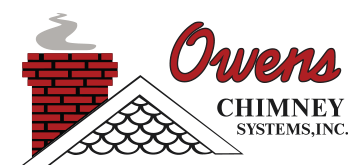If you own a wood burning fireplace, it’s pretty clear the effects burning a fire has on your chimney. The smoke that is released has plenty of gases and chemicals that can stick to the inside of your chimney in the form of soot and creosote. This is why the Chimney Safety Institute of America (CSIA) recommends having your chimney inspected and cleaned on an annual basis. If you own a gas fireplace, you might think that inspection and cleaning aren’t as important. Gas burns clean, right? Why add the expense of an annual inspection and cleaning to your budget? If this is the way you’ve been thinking, please think again!
Advantages of Gas Burning Fireplaces
The first advantage that comes to mind when considering a gas burning fireplace is the convenience factor. Let’s face it – finding trees that need to be cut down, cutting them down, cutting up the wood into usable-sized pieces, transporting and unloading and stacking that wood – we’re not talking about just a little time and effort here. Although this can be a satisfying workout, sometimes you just don’t have the time. With a natural gas fireplace, this effort is non-existent. You push a button and you have a fire. It’s as easy as that.
Another great thing about gas is that there’s a lot less mess. You don’t have to scoop out ashes once a week, and you don’t have the soot and creosote build-up you’ll have with wood. To top it off, gas is a cheap fuel, which means that, unless you have ready access to free firewood, you’ll be saving some money when you choose gas over wood.
Cleaning Your Gas Fireplace
So if burning gas is, indeed, a cleaner option, why is yearly servicing important? According to the CSIA website there are a couple of good answers to that.
First, your gas appliance will run more efficiently than a wood fire, and that means cooler. While that’s good when it comes to your heating bills, it’s not so great when it comes to combustion. In order to have enough draft to make your venting system work properly, it needs to get to a sufficient heat level. It’s important that you have your gas appliance checked by a professional to make sure that level is met, or you may be putting your family at risk for carbon monoxide poisoning.
Second, when not enough heat is generated, the interior of your chimney will remain cool. This allows the water vapor that is produced from burning in your fireplace to condense on the cooler surface. When this happens, it can cause corrosion on the interior of your chimney, which can lead to a dangerous breakdown in the makeup of your chimney. This, again, can put your family in danger of carbon monoxide poisoning.
Professional Service
If you haven’t had your gas fireplace serviced in awhile, now’s the time to call in professional help. We at Owens Chimney Systems are dedicated to ensuring that your gas fireplace system is clean, safe, and in great condition to give you a beautiful, efficient experience.
